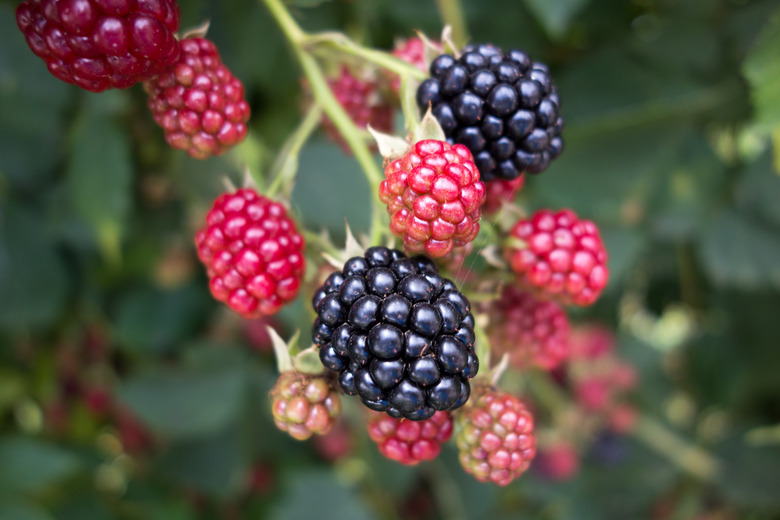The Difference Between Blackberries And Marionberries
When it comes to different types of berries, some people don't discriminate. They'll eat their fill of whatever strawberry, raspberry, blueberry or blackberry is sitting in front of them. But some berry connoisseurs are a little more discerning and can spot the difference between a marionberry (Rubus x 'Marion,' USDA zones 7-9) and a common blackberry (Rubus spp.) from a mile away.
Whether you're not picky about your berries or you eagerly await marionberry season every year, learning more about the differences between the two can help you have some delicious berries in your future.
Marionberry History
Marionberry History
The marionberry isn't entirely different from a common blackberry, which is also sometimes referred to as an Allegheny blackberry. Allegheny blackberries are the ones you'll find most commonly in stores, at your local farmers markets or growing in brambles all over North America. They're known for their dark blue or sometimes violet-like color.
Marionberries (which are sometimes also referred to as a marion berry or the marion blackberry) belong to the same family as the Allegheny blackberry. But while common blackberries are native to the North American continent, marionberries are a hybrid product. In 1948, a scientist at a breeding partnership between the University of Oregon and the U.S. Department of Agriculture worked to create a hybrid of two different blackberry hybrids, the Olallieberry and Chehalem blackberries.
The result was the marionberry, named for its inception in Marion County, Oregon. Since its 1956 debut into the Oregon market, it has become one of the most beloved types of blackberry hybrids available.
Differences Between Common Blackberries And Marionberries
Differences Between Common Blackberries And Marionberries
To the naked eye, the marionberry and blackberry seem relatively similar. They do contain mostly the same nutritional value – both types of blackberries are rich with antioxidants, vitamin A, vitamin C and fiber. Berry lovers understand there are several differences between the two, however.
For one, the colors between the two berries are slightly different. When marionberries are unripe, they're often the same shade of red as the common blackberry. But when it ripens, it often turns a deeper shade of violet or purple than the Allegheny. Marionberries are also often a little bigger than common blackberries and shaped more conically.
Additionally, there's a subtle difference in taste. Marionberries are known for having sweeter, juicier and earthier flavors than the common blackberry. That complex mix of sugary earthiness has won it comparisons to the popular Cabernet grapes, which make Cabernet wines. That earthiness also makes them more popular than common blackberries for uses in savory recipes, such as being made part of a glaze to top succulent meat like duck or to balance out the heat of spicy pepper jelly.
Allegheny blackberries often pack a much more tart punch. It's purely up to people's personal taste as to which one they prefer, but the marionberry's complex flavor has drawn many admirers across the United States.
Where to Find Marionberries
Where to Find Marionberries
Common blackberries are a much-loved berry. In addition to just being a great snack, people love using them as ingredients in dishes including pastries, marinades, glazes, summer salads, wine and jams. Marionberries are used in all the same types of recipes, but they're much harder to find than common blackberries in most parts of the country.
If you're in Oregon during the late-summer marionberry season, you're in luck. The majority of marionberries wind up staying in Oregon, where the bulk of each year's crop is still grown in or near Marion County. If you're in a different part of the United States and still want to get your hands on some marionberries, talk to your local grocers or farmers markets and see if they're able to order some for you.
